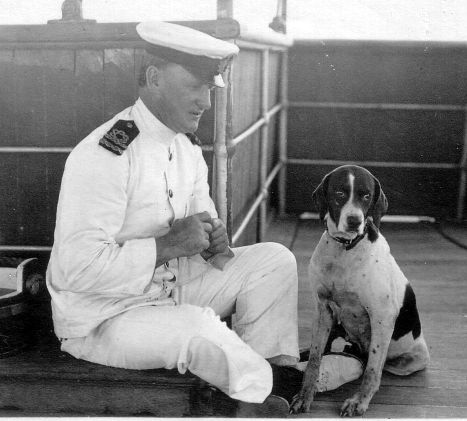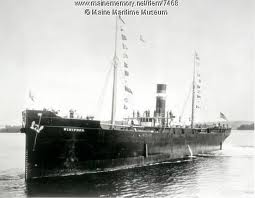Charles Bernard Blencowe (1880-1964).
My Uncle Charlie, who I remember well, was one of seven brothers, amongst whom my father was one. The eldest, Colonel Edward Blencowe (1877-1960), was our Notable Blencowe in Vol 26 No 1 February 2011. He led an adventurous life, but nothing compared to the extraordinary life of his younger brother Charlie.

Captain Charlie Blencowe with ‘Pointer’
I have some fascinating letters that Charlie wrote to his mother in 1902 when he was aboard the windjammer 'Scottish Moors', describing the dangers rounding Cape Horn in very stormy conditions. Two years earlier, in 1900, he was caught up in the Boxer Rebellion in North China. Why he was there, I have yet to discover.
However, he was originally educated at Rossall School and trained as a seaman on H.M.S Conway after which, rejecting a Royal Navy scholarship, he was awarded a Merchant Marine Master's Certificate, This led him to the 'Scottish Moors' and a life on these early sailing vessels. Another rather amusing and uncomplimentary letter describes his views about the customs officers at New York and the state of city itself.
However his most wild exploits were in 1915 during the First World War in East Africa. For those who have read C.S Forester's 'The African Queen' or seen the film, which I feel can only be based very loosely on Uncle Charlie's exploits, I can confirm that he is very unlike Humphrey Bogart and he assured me there was no Katherine Hepburn ! (I wonder?) . However I have some fascinating letters that he wrote to his mother describing the destruction of the German gunboat 'Muansai' which saved Lake Victoria and probably the whole of East Africa from German domination.
A newspaper extract from the leader of "British East Africa Newspaper" dated 20 March, 1915 best describes the action
Bravo Winifred
"The news of the destruction of the German Lake Steamer the Muanza by our own little steamer the Winifred captained by Captain Blencowe, in Speke Gulf, is an event of greater significance, interest and importance than the man-in-the-street in Nairobi possibly realises. In the first place, though the matter has been kept from prominence, the existence of the Muanza, armed with a fairly heavy gun, roaming the Lake in search of prey, has been exercising the minds of the authorities for some months. It was decided to arm one or more of our own ships, and the Winifred commanded by Captain Blencowe was selected to hoist the naval pennant and act as Britainis war dog on the Great Lake of Central Africa. Around Kisumu and the Uganda ports the quest of the Winifred chasing the Muanza has been the talk for a long while. With our mail boats, such as the Clement Hill later commanded by Captain Blencowe crossing the lake, the Muanza presented a distinct menace. Since the SS. Sybil was driven ashore, the Muanza, we are told, has actually been visiting the sunken vessel, (the 'Sybil' having her funnel showing above the surface) and attempting to remove some of the war plates.

News was conveyed recently to the Winifred from shore that the Muanza was hovering round Speke Gulf. The little Winifred, of about 600 tons, promptly went to look for the enemy and after a smart chase got within, we are told, about 400 yards. Then the 4 inch gun spoke and the Muanza, game to fight, replied with her artillery and rifles. We learn unofficially that the Muanza was properly peppered and had to make for the shore, where she was abandoned. Then the Winifred let her have it properly, until she was pounded out of all shape. We learn, (also unofficially) that the Winifred suffered no casualties; all the shots from the Muanza going over her, or short. In fact except a bullet hole through her funnel (an honourable mark of distinction) she escaped scatheless, due to the bad gunnery of the foe.
Those who know their Lake residents will realise that this victory, so long desired, of the British converted gunboat over that of the German variety has been hailed with jubilation and that Captain Blencowe will have received many congratulations, which in fact are fully deserved."
Though he never received a medal, I have here a telegram from General Lord Kitchener congratulating Charlie on his sinking of the Muanza. Later he was to Captain the Clement Hill, mentioned above, the first Lake Mail Boat.
In later years he became a leading member of the Nairobi City Council and ran a coffee plantation near Nairobi at Kabete outside the city where I first stayed with him and my Aunt Mildred and where he told me many amazing stories of his early life, many of which I still remember.
Peter Blencowe
He has been dead for 307 years but still keeps appearing in the media!
The Royal Society has recently published early papers from its Philosophical Transactions. Some of the more interesting ones appeared on the BBC website. One was by the mathematician Dr John Wallis, father of Lady Anne Blencowe:
Death by lightning 1665
Dr Wallis from Oxford wrote a paper about a grisly boating accident during a thunder storm in Oxford, which left a "stinking sulphurous smell in the air". Two students out in a boat had been struck by lightning, one died instantly, the other was "stuck fast in the mud", apparently "with his feet downwards and his upper parts above water". Besides "numbness" he was unhurt but had no memory of what happened to him and why he was stuck in the mud.
Dr Wallis also provides a detailed account of an autopsy he and others performed on the dead student. He reports the body had no wounds apart from a series of black marks on the neck, shoulder and chest "as if it had been seared with a hot iron". Some of the buttons on the student's doublet had also been blown off, he added.
Jack Blencowe, Oxford
Keeping it in the family, Dr Wallis' daughter, Lady Anne Blencowe made an Australian newspaper, The Daily Telegraph as part of a lengthy article by Gary Dunn, Xmas History: The making of a modern Christmas on 22 Dec 2011.
Samuel Pepys also enjoyed mince pies and his 17th-century "mincemeat" really did contain meat. Mixed with fruit and alcohol, the shredded flesh of beasts slaughtered in the autumn could thus be preserved in stone jars for the Christmas feast. Anne Blencowe's 1694 recipe recommended a boiled calf's tongue chopped up and mixed with beef suet, 'raisins of ye sun', lemon rind and spices.
I think I'll stick to turkey! Anne